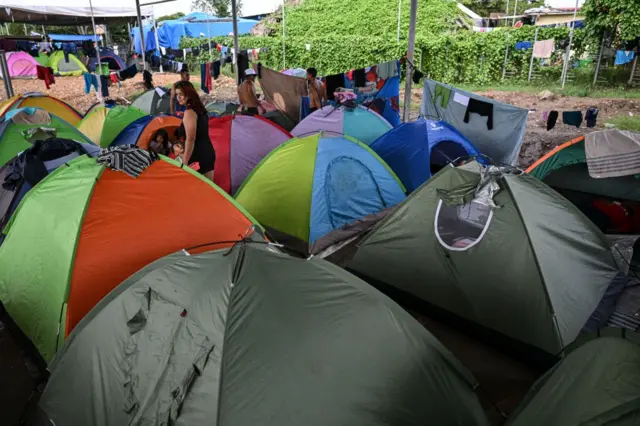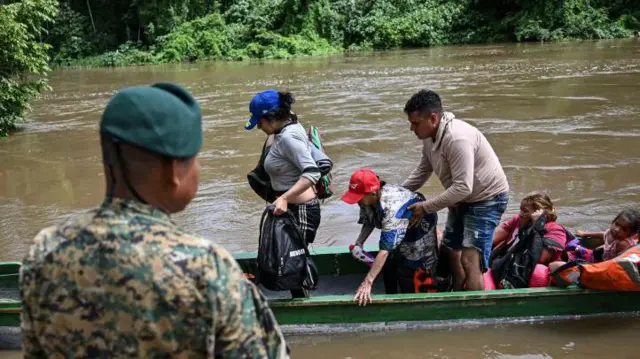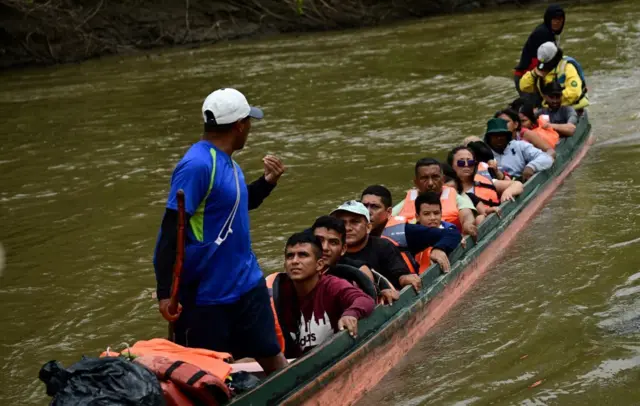The measures with which Panama reduced the passage of migrants through the Darien by almost half

After identifying and registering the migrants in the aforementioned “humanitarian passage” through the jungle, the Panamanian agents take them to a shelter where they receive assistance while their fate is decided.

Migrants camped next to the Lajas Blancas shelter, in Darién, waiting for their fate to be decided. Getty Images
«The staff selects those who may be designated for the voluntary return program, deportations and expulsions. We carry out a legal process where the decision is communicated to them and they have the right to appeal. When the decision is final, we proceed to carry out the flight and the deportation or expulsion,” indicates the director of Immigration.
However, the majority of migrants who manage to cross the Darien do not end up being deported and are allowed to continue their route north.
Since the start of the program in mid-2024, 1,744 irregular migrants have been repatriated, a figure that represents only 0.6% of the 302,203 who transited through Panama in the year.
«Those who maintain security alerts and other people who could represent risks to Panama or other countries are sent back to their countries of origin. Also to those who request it voluntarily,” explains Vice Minister Carlos Guevara Mann.

The vast majority of migrants who are intercepted continue their journey north. Getty Images
Venezuelans – almost 7 out of every 10 migrants who cross the jungle – are exempt from deportations since Panama does not have diplomatic relations with Venezuela.
“The Venezuelan regime does not agree to the repatriation of its nationals, in open violation of the most basic human rights criteria,” denounced the Vice Minister of Multilateral Affairs and Cooperation.
At the moment, the Panamanian government has agreements with Colombia, Ecuador and India to repatriate irregular migrants under the voluntary return, deportations and expulsions program.
Given the small number of deportations, migration expert Andreas Feldmann, professor of political science at the University of Illinois at Chicago, considers that this factor “has a rather symbolic effect” in reducing the migratory flow through Panama.
He clarifies, however, that repatriation flights “exercise a certain influence from the point of view of deterrence.”
Will Darien close in 2025?
It is not clear to what extent other external factors – unrelated to the actions of the Panamanian government – have influenced the 42% reduction in irregular migratory transit through the Darien.
The Migration Coordinator of the Red Cross cites possible triggers such as “changes in asylum and reception policies in destination countries, and the change in context and measures to regulate migratory flows in countries of origin and transit.”
Migration expert Andreas Feldmann mentions, more specifically, the tightening of border surveillance in the United States and the greater difficulty in achieving political asylum in that country, which could have discouraged many people who were considering taking the land route from South America.
However, he clarifies that this could be offset by the increase in migratory pressures “due to what happened in Venezuela with the elections, what is happening in Haiti and, in general, the worsening of conditions in the region, including in Colombia.” .
In any case, the reduction in the migratory flow through Darién was especially noticeable in the last months of 2024, precisely after the fences were installed, surveillance increased, and repatriation flights began to operate.
In December, 4,558 people crossed, 80% less than the 24,626 in the same month of 2023.

Panama trusts that migratory transit through the Darién will continue to fall in 2025, but it does not see it as realistic to completely close the crossing. Getty Images
BBC Mundo asked the director of Immigration of Panama if President Mulino will fulfill his promise in 2025 to completely close the passage to irregular migrants through the Darien.
«When the president talked about closing the border, he obviously did so figuratively, because it is a jungle. Not even by putting up a wall we can suddenly close the border definitively,” he responded.
For the moment, he indicated, the Panamanian authorities plan to reinforce patrolling in the jungle and are negotiating with the United States the contribution of more funds to expand the program of voluntary return, deportations and expulsions.
“I wish traffic would reach zero, but the truth is that this will depend on external agents or situations on which Panama as such does not have a direct effect,” he stated.




